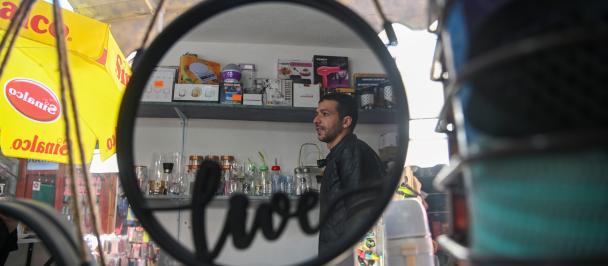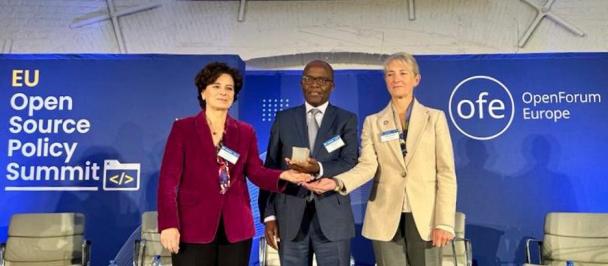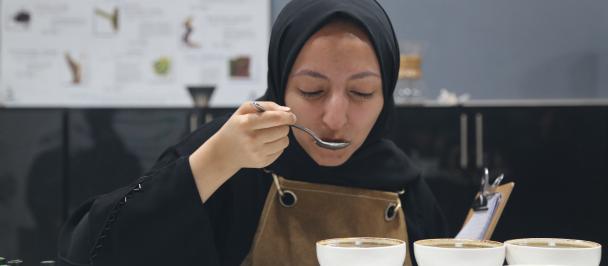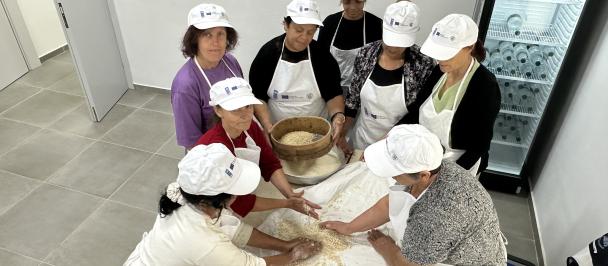New initiative will create jobs for 2,000 Syrians and host community members, provide Turkish language training to 52,000 Syrians , improve municipal services for more than 307,000 Syrians and host community members. Photo: UNDP Turkey
Turkey Resilience Project in response to the Syria Crisis (TRP), financed by the European Union (EU) and implemented by the UN Development Programme (UNDP) in cooperation with the Ministry of Industry and Technology, the Ministry of National Education and Ilbank was officially launched today in Ankara. Focusing on job creation, strengthening municipal services and Turkish language training, the project is financed by the EU Regional Trust Fund in Response to the Syrian Crisis (EUTF).
The EU and UNDP collaborate in contributing to the economic and social resilience of Syrians and host communities in Turkey, and the strengthening of national and local institutions. The two-year project with €50m budget focuses on promoting job creation, strengthening local government capacities and municipal services and delivering Turkish language training for Syrians in 11 provinces of Turkey. The project will benefit 2,000 Syrians and host community members for employment and livelihoods, 52,000 Syrians for Turkish language training, and more than 307,000 Syrians and host community members for improved municipal services.
It aims to share Turkey’s burden as the country hosting the highest number of refugees in the world. Project activities in 11 provinces of Turkey intend to enable both Syrians and host communities to cope with and recover from the crisis, and build a sustainable future for individuals, communities and institutions.
Delivering the opening remarks in the event, Ms. Irena Vojáčková-Sollorano, UN Resident Coordinator and UNDP Resident Representative emphasised that Turkey and Turkish nation offered outstanding generosity in hosting 3.5 million Syrians, setting an example for the world. Noting that the global stance vis-à-vis the refugee crisis is a reflection of the humanity’s common conscience, Ms. Vojáčková-Sollorano stated that the problems faced by the world could only be responded by solidarity, cooperation and common will. Underlining that the development-centred approach to humanitarian crises will succeed if it is reinforced by activities in education, healthcare, entrepreneurship, socio-cultural cohesion through long-term planning, cooperation with local partners and concrete projects, the Resident Coordinator expressed that the EU-funded Turkey Resilience Project in response to the Syria Crisis would be an exemplary, satisfying project elevating hopes for all.
Speaking at the event, Mr. Claudio Tomasi, UNDP Turkey Country Director, recalled that Turkey displayed great generosity and hospitality for 3.5 million Syrians, and highlighted that this new EU-funded project would be a significant step to share Turkey’s burden. Stressing the Project’s objectives, Mr. Tomasi said: “Under the €50m-budget Project, our objective is by 2020 to enable 2,000 Syrians and host community members to have employment and livelihoods, 52,000 Syrians to receive Turkish language training, and more than 307,000 Syrians and host community members to enjoy improved municipal services.”
Project activities will be implemented in Gaziantep, Hatay, Şanlıurfa and Kilis as cities most affected by the Syrian crisis as well as such other large cities of Turkey as Istanbul, Izmir, Bursa, Adana, Konya, Mersin and Manisa. The implementation started on 1 February 2018.
Ninety one percent of Syrians in Turkey live mostly in urban areas of Southeast provinces and metropoles such as Istanbul, Ankara, Izmir and Bursa. One of the biggest impacts of the sudden population flux is on the labour markets and economy. On the other hand, the population growth due to the Syrian crisis led to a major rise in demand for the services of local governments and municipalities including waste and wastewater management and firefighting services. Further, a lack of Turkish language skills is a major barrier for Syrians’ access to employment opportunities and economic and socio-cultural interaction in Turkey.
UNDP is the sole UN agency providing direct support to municipalities both in municipal services including waste and wastewater management, physical infrastructure development and technical assistance.
UNDP support through various projects to date has primarily focused on providing equipment and developing capacities and infrastructure. The new project expands the efforts, through covering new municipalities with high Syrian population, to improve municipal services in the face of rising demand, enhance capacities and provide technical assistance at a larger scale.
UNDP’s previous projects also delivered language skills training to Syrians. The new project will significantly scale up the effort by a mixed learning approach involving classroom and online learning programmes. It will also promote access of women and youth to labour markets, contribute to socio-economic empowerment of individuals and communities. UNDP collaborates with chambers of industry and commerce to support economic activities and facilitate access to labour markets.
For more information: Faik Uyanık, Chief of Communications, UNDP Turkey. faik.uyanik@undp.org
E.Ruşen İnceoğlu, Communications Expert, UNDP Turkey’s Syrian Crisis Response and Resilience Programme rusen.inceoglu@undp.org

 Locations
Locations


